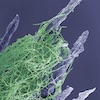 Destructin-1 is a Collagen-Degrading Endopeptidase Secreted by P. destructans, the Causative Agent of White-Nose Syndrome
Destructin-1 is a Collagen-Degrading Endopeptidase Secreted by P. destructans, the Causative Agent of White-Nose SyndromeAnthony J. O’Donoghue, Giselle M. Knudsen, Chapman Beekman, Jenna Perry, Alexander D. Johnson, Joseph L. DeRisi, Charles S. Craik, and Richard J. Bennett
PNAS, 2015Abstract: Pseudogymnoascus destructans is the causative agent of whitenose
syndrome, a disease that has caused the deaths of millions
of bats in North America. This psychrophilic fungus proliferates at
low temperatures and targets hibernating bats, resulting in their
premature arousal from stupor with catastrophic consequences.
Despite the impact of white-nose syndrome, little is known about
the fungus itself or how it infects its mammalian host. P. destructans
is not amenable to genetic manipulation, and therefore understanding
the proteins involved in infection requires alternative approaches.
Here, we identify hydrolytic enzymes secreted by P. destructans, and
use a novel and unbiased substrate profiling technique to define
active peptidases. These experiments revealed that endopeptidases
are the major proteolytic activities secreted by P. destructans, and
that collagen, the major structural protein in mammals, is actively
degraded by the secretome. A serine endopeptidase, hereby-named
Destructin-1, was subsequently identified, and a recombinant form
overexpressed and purified. Biochemical analysis of Destructin-1
showed that it mediated collagen degradation, and a potent inhibitor
of peptidase activity was identified. Treatment of P. destructans-conditioned
media with this antagonist blocked collagen degradation
and facilitated the detection of additional secreted proteolytic activities,
including aminopeptidases and carboxypeptidases. To our
knowledge, these results provide the first molecular insights into
the secretome of P. destructans, and identify serine endopeptidases
that have the clear potential to facilitate tissue invasion and pathogenesis
in the mammalian host.
